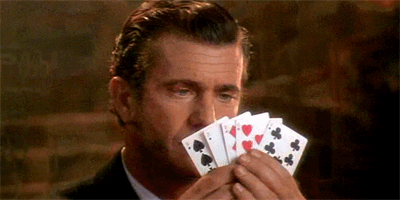Today’s Portuguese written work is about my mis-spent youth playing poker in Preston in the eighties. There are notes at the bottom. Thanks to Dani Morgenstern for the corrections.

Quando eu era jovem, os meus pais tinham* uns amigos – os Robinson – que eram um padre na igreja anglicana e a sua mulher. Tinham três filhos – dois rapazes e uma rapariga. Uma vez por mês (mais ou menos) havia festas na casa deles ou na nossa nas quais as duas famílias jogavam cartas juntas.
Jogávamos póquer principalmente. Estávamos nos anos oitenta, portanto não havia nada de** saudável nesta situação. Toda a gente fumava (incluindo os filhos mais crescidos), toda a gente bebia vinho, cerveja e (ainda pior) coca cola (desculpe, Cristiano), e comia chocolate***. Ouvíamos a música popular da época, escolhida pelos adultos de cada família, tal como Electric Light Orchestra e Doctor Hook e Elkie Brooks e apostávamos pequenas somas de dinheiro – talvez cinco libras – que os pais proporcionavam da sua garrafa. Sim, não me engano, quero dizer “garrafa” mesmo: os meus pais poupavam moedas numa enorme garrafa de whisky vazia, com dez litros**** de capacidade.
Se ganhássemos qualquer quantia acima da soma inicial, permitiam-nos ficar com a diferença. Numa noite de sorte, conseguíamos ganhar o suficiente para comprar uma banda desenhada e umas guloseimas na tabacaria. Jogavamos até depois de meia-noite. E foi assim que aprendi a jogar póquer!
*=this sort of text is a good example of use of the imperfect tense because its about something that used to happen regularly. I kept forgetting and slipping into perfect tense so a few of the corrections were examples of that.
**=I forgot the de. Nada de saudável. “Nothing of healthy” not “Nothing healthy”. And so we see the dangers of translating English phrases literally instead of writing the way Portuguese people write.
***=I wrote “chocolates” because we were eating quality street but chocolate in Portuguese refers to chocolate the substance not chocolate the discrete unit of delicious goodness so you can’t do that.
****=actually I’ve no idea what the capacity was but it was the size of a small child. In the original I said it was cinco galões, but although “galão” does mean gallon, nobody uses gallons in Portugal and it’s best to avoid it because there is a kind of coffee called a galão (it’s mentioned in this video from Practice Portuguese at about 1:45, for example) so if you use the word in conversation you’ll convey the idea that your car gets fifty miles to the milky coffee… Which is probably good if you are trying to win investment in your coffee-powered auto company but in most situations it’s just going to cause confusion.
One word I didn’t use in this is “baralhar” which means to shuffle a pack (baralho) of cards, but it can be used in other contexts where you’re mixing things up and putting things into a state of randomness. I happened to notice the same word the other day when I was looking at training courses available on the Bertrand website. One is about critical thinking and its called “Baralhar e Voltar a Pensar” – basically reshuffle (your ideas) and think again.
Mel Gibson? On my blog? It’s more likely than you think.
LikeLike
Obrigado pelo shout-out Colin! Bom trabalho como sempre 💪Abraço
LikeLiked by 1 person
Muito obrigado! E bem vindo, professor!
LikeLike